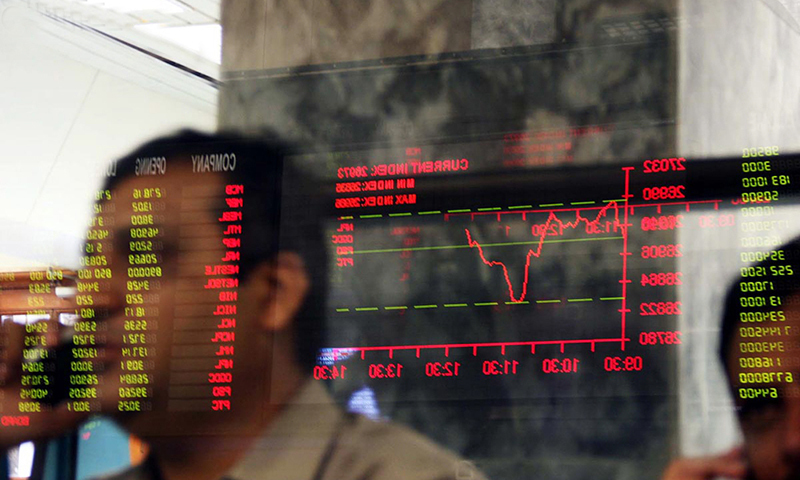KARACHI: Bloodbath was witnessed at the Pakistan Stock Exchange (PSX) on Monday where investors watched with bewilderment as massive selling pressure turned the price board all across in the red fewer than five minutes after the start of trading.
Within just seven minutes, the benchmark KSE-100 index caved in by 2,302 points (6.41per cent) — the biggest single day decline in 10 years. A massive sum of Rs184 billion was wiped off the market capitalisation during the day.
The rupee also plunged by Rs3.65 against the US dollar to Rs157.9 in the interbank market from Rs154.25 on Friday after showing exchange rate stability over the past six months. In the open market, the greenback increased by Rs2.70 to Rs157 as against Rs154.3 on the start of trading on Monday.
Meanwhile, local bullion traders jacked up 10-gram and one-tola gold prices by Rs600 and Rs700 to Rs81,618 and Rs95,200, respectively.
All Pakistan Jewellers Association president Mohammad Arshad claimed that the massive rupee depreciation put extra pressure on local gold rates.
Trading halted for 45 minutes; rupee plunges against dollar; gold prices soar
Fortunately for the market, the new circuit breaker regulations, introduced on Dec 31 last year, came to the rescue to ‘halt trading’ as the market capitalisation-based KSE-30 index dropped by 4pc and did not recover for 5 subsequent minutes.
The carnage at the PSX was in line with the meltdown in global markets where equities from Wall Street to the Middle East and Asia saw heavy bleeding on fears of coronavirus impact of a greater than expected slowdown in world economies.
It provided a cooling period and the time to collect margins to run the mark-to-market activity and apply the risk management measure. Brokers and traders tried to calm the market during 45 minutes after which trading resumed according to the new regulations. The subsequent recovery saw the index close with a loss of 1,161 points (3.04pc) at 37,059.
The problem was exacerbated by the mind-boggling dip in international prices of crude. As greed and pride intensified among the Opec cartel members with major countries refusing to reach an agreement on the cut in oil output to reduce supplies to global markets, oil prices crashed in international markets with Brent oil taking a tumble by 25pc to $34 per barrel and WTI down 26.5pc to $30.
Samiullah Tariq, director research and business development at Arif Habib, said: “Pakistan being a net importer of oil with petroleum group imports constituting 25pc of the imports, the downside in international oil prices was a boon. It will result in lower trade and current account deficits and savings on foreign exchange. The low oil prices would translate into lower inflation, leading to monetary easing and improved consumer purchasing power.”
Atif Zafar, chief economist at Topline Securities, commented: “On an annual basis $20/barrel lower oil prices would reduce Pakistan oil import by $2.5bn, which constitutes 50pc of Pakistan’s current account deficit. The benefit will travel down to lower inflation and around 100bps cut in policy rate in the upcoming monetary policy due later this month.”
At the PSX on Monday traded volumes rose 26pc over the previous day to 244m shares. Traded value managed to decrease by a miniscule 0.2pc to reach $73.3m. Stocks that contributed significantly to the volumes included FCCL, BOP, MLCF, KEL and TRG, which formed 36pc of day’s total volumes.
The exploration & production sector took the brunt of the blow and declined and hit their lower circuits. Due to its heavyweight in the KSE-100 index it dragged down the entire market. Stocks that contributed most to the index’s fall were HBL, UBL, OGDC and PPL — all closing at their lower circuits. In contrast, cement stocks led by Lucky Cement rising 6.9pc, DGKC 7pc, MLCF 7pc and FCCL 6.9pc provided some respite to the index.
Analysts affirmed that while sectors like cement, steel and automobiles were major beneficiaries, lower prices were seen as translating into dent on profitability of exploration & production, refineries and oil & gas marketing companies. The banking sector would bear brunt of policy rate cut which stares them in the face.
Published in Dawn, March 10th, 2020














































